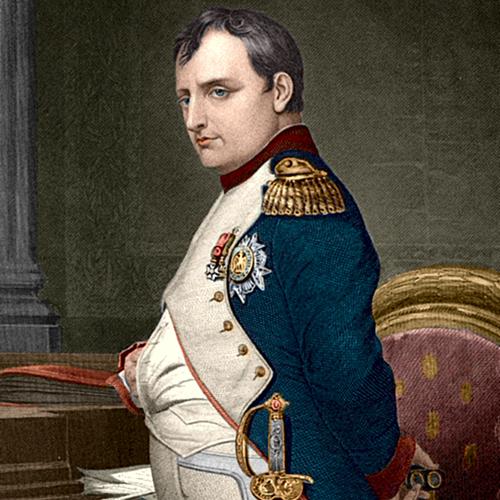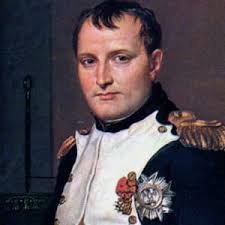“Love Is the Idler’s Occupation, the Warrior’s Relaxation, and the Sovereign’s Ruination”
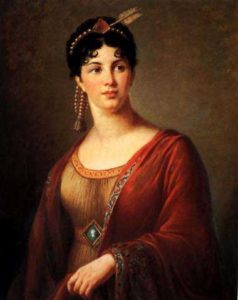
Giuseppina Grassini
At the height of his powers, Napoleon Bonaparte had established an empire that dominated much of continental Europe at the beginning of the 19th century. He was, and still is considered one of the greatest military minds in history. However, the famous Italian opera singer Giuseppina Grassini (1773-1850) had absolutely no problems outmaneuvering the great general and quickly conquered his heart.
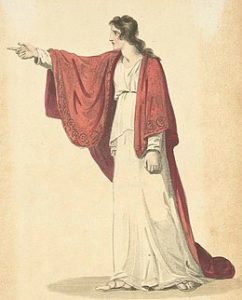
Giuseppina Grassini as Orazia in Cimarosa’s
Gli Orazi ed i Curiazi
She was described as “one of the most celebrated Italian singers, and the most beautiful woman of her day. Few of her profession ever boasted of a career so long and so brilliant as hers. In Italy, France, Germany, and England, she achieved for herself the highest reputation, and for many years ruled in undisputed possession on the throne of song.” Grassini came from humble beginnings, but she sang “like a nightingale.” She was sent to Milan to study opera, and Count Alberico Belgiojoso quickly became her promoter, protector, and her lover. Her operatic star rose meteorically, and a number of operatic roles specifically created for her, made her one of the most famous artists of her time.
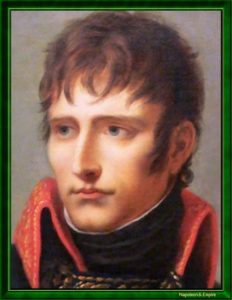
Napoleon Bonaparte
Having decisively beaten Austrian troops at the Battle of Lodi, Napoleon triumphantly entered Milan on 15 May 1796. Although not entirely trustworthy, there is an eyewitness account of Madam Grassini trying to seduce Napoleon. Supposedly she once remarked around 1800, “I was then [in 1796] in the full lustre of my beauty and my talent. My performance in the “Virgins of the Sun” was the topic of universal conversation. I fascinated every eye and inflamed every heart. The young General [Napoleon] alone was insensible to my charms, and yet he was the only object of my wishes! What caprice, what singularity!” Initially it seems, Napoleon was not an easy target, but Grassini certainly had a carefully selected armory of female charms. Apparently, “she spoke a mixed jargon of French and Italian, all her own, which allowed her to say anything, and by which she profited to make the most amusing remarks and the most amusing confidences, blaming what she said on her ignorance of the language whenever she said anything that could shock or hurt someone.” Charming, coquettish, witty and sporting an incredible voice paired with physical beauty, Napoleon did not stand a chance.
Domenico Cimarosa: Gli Orazi ed I Curiazi
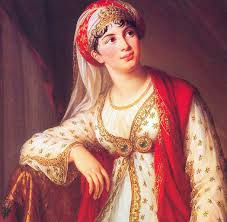
Giuseppina Grassini
A valet reports that Madame Grassini “several times took tea with Bonaparte in the General’s apartments, and that he was charmed with Madame Grassini’s delicious voice, and if his imperious duties had permitted it he would have listened with ecstasy to her singing for hours together.” As it happens, Napoleon quickly took her as his lover and demanded that she join him in Paris. Napoleon set up Grassini with a posh home and an allowance of fifteen thousand francs a month. In turn, she “exhibited her brilliancy at the theatre and the concerts at the Tuileries, where her voice performed wonders.” She even sang at the national fête under the dome of the Invalides on 14 July 1800. We should not forget, however, that Napoleon was married to Josephine, a woman prone to excessive jealousy. As such, Napoleon was not able to visit Madame Grassini as often as he might have wished, and Grassini fell “violently in love with the celebrated violin player Pierre Rode.” More or less secretly, Grassini escaped Paris in November 1801 on an extended counter tour of Holland and Germany, accompanied by Rode.
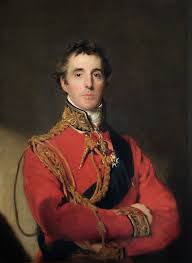
Duke of Wellington
In the event Madam Grassini made her way to London and performed for several months at the Haymarket Theatre. Originally eyed with suspicion, she soon won over her audience “by her graceful figure, her fine expression of face, together with the sweet manner.” Not only was she rapturously applauded in public, but she was taken up by the first society, fêtée, caressed, and “introduced as a regular guest in most of the fashionable assemblies.” Grassini continued to perform in London for the next two years, but eventually returned to France in 1807. She was quickly engaged to sing in Napoleon’s newly established imperial choir, and the Emperor supposedly “applauded her vociferously.” We don’t know for sure if the affair resumed, but Napoleon continued to generously support her financially. Militarily, the Duke of Wellington eventually conquered Napoleon, who was in turn also conquered by Madam Grassini. But that’s clearly the topic for another anecdote.
The Napoleon series is in celebration of his 250th anniversary this year.

